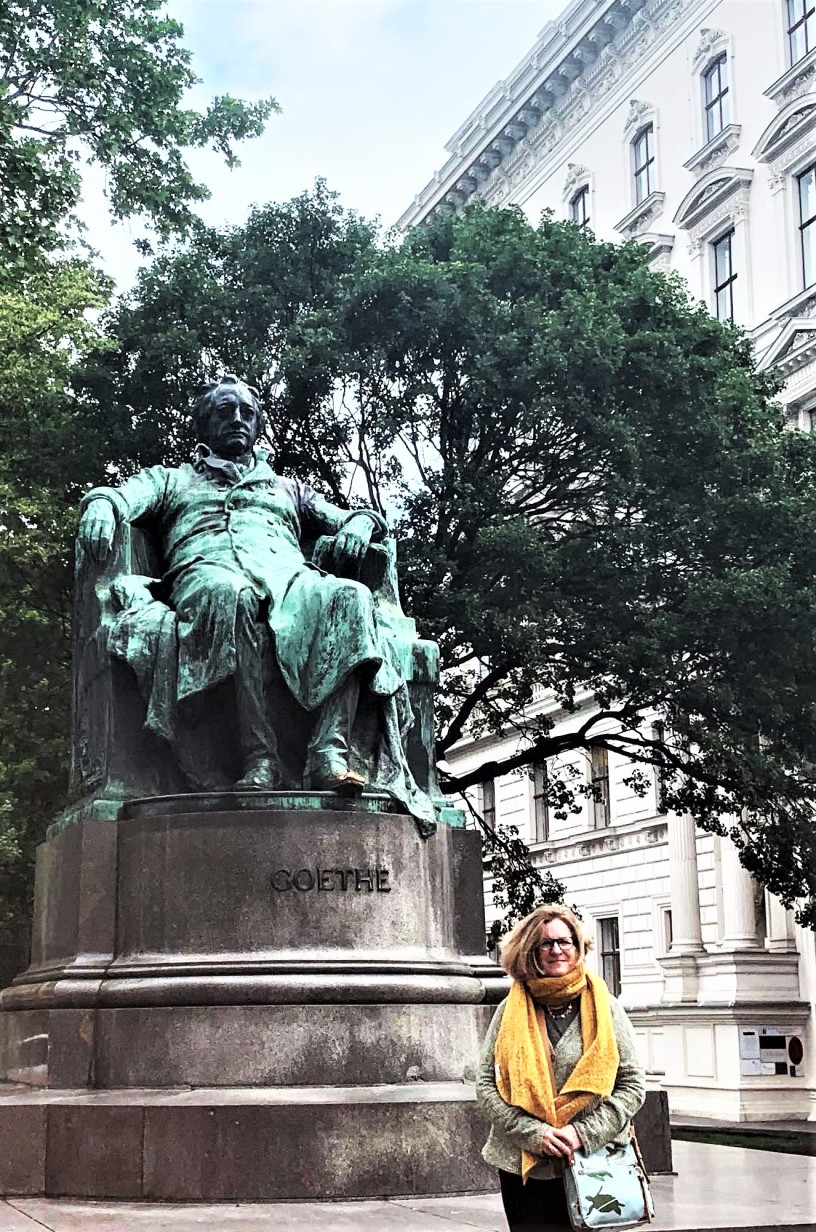What is the organic centre, the focal point, of your diverse activities? The core from which everything radiates. Johann Wolfgang von Goethe had a word for this: Mittelpunkt.
Goethe has been for the Germans an exemplary representative of a life in which extraordinary gifts of imagination and reflection were made to serve a unified and effective vision of man. He was not only worshipped by Germans, but also by Americans, French and English. Emerson said of Goethe: “there is something gigantic about the man, measure him how you will” (2). He was known as the “greatest poet of modern times…the greatest modern man”. Goethe was not only a poet; his activities included the intensive study of science, nature, art, architecture, chemistry, poetry, prose. While diverse in genre, these activities were all related to his organic centre, his Mittelpunkt.
In a Self-portrait of 1797, Goethe speaks of his varied activities in a way which provides a key to their hidden connections. He states that the Mittelpunkt und Base(central point and base) of his existences was the poetischer Bildungstrieb(poetic urge to be educated). “Mittelpunkt, in Goethe’s language, is the organic centre; whether in a plant, a poem, or a human being, from which everything radiates, the unity from which all variety proceeds, the focal point which, once discovered, illuminates all the parts”(Goethe, a Collection,163).
What distinguishes Goethe from his remarkable contemporaries? According to the literary critic, Victor Lange who read through the enormous body of his more than fourteen thousand letters, his conversations and the thousands of pages of notebooks, he was a man of letters in the comprehensive sense that few of his great contemporaries ever attained.
“He was alive, at every pore of his skin, and received every impression in a sort of undistracted leisure; which makes the movement of his mental machinery one of the most extraordinary exhibitions which this planet can ever have witnessed” (William James, 3).
Of course, Goethe was a romantic genius. How did his scientific interest enhance his thinking and writing? Lange supposes that his notion of science would satisfy his curiosity to the principles of functioning, of relationships, and of interdependence. Goethe believed that science served humans the forms by which life in its totality can be understood and ordered. Botany, geology, anatomy, zoology all taught him to look on even the most trivial and insignificant of natural phenomena with passionate interest (165). Paul Valéry observed this in Goethe, whom he refers to as a poet-scientist in his work Discourse en l’honneur de Goethe (1932)—[on my Summer Reading list!!]. Valéry states that Goethe penetrates the forces which govern the forms.
As a Linguist, I was first drawn to Goethe’s gift of translating French, English and Italian in poetry and prose. Through his study of European languages and cultures, which are vital to effective translations, Goethe discovered “a thousand harmonious details”. The more I learn about the interests of Goethe, however, the more I am intrigued. I too have keen interests in science, art, architecture, travel, language, etymology, nature, and literature which have diversified My Frenchquest quite extensively. After reading this collection of critical essays on Goethe, I have been trying to identify the “organic centre” or focal point of my interests. For Goethe, his Bildunstrieb, organic centre, was poetry–for me, my organic centre is the desire to be educated through life experiences (in German, Trieb ), as well as to educate others.
The older Goethe constantly made the transition from one kingdom of the mind to another: from poetry to science, from philosophy to religion, and from each or all of these ever back again to poetry (Willoughby, 168). The older Robyn Lowrie constantly makes the transition from literature to art, from linguistics to cetology, from French language and culture to philosophy and theology, and from each or all of these ever back to Bildungstrieb?
I would like to hear from my readers: What is your organic centre, the focal point of your diverse activities?
Copyright 2021. May be quoted in part or full only with attribution to Robyn Lowrie (www.frenchquest.com)
Work Cited
Lange, Victor. Goethe, A Collection of Critical Essays. N.J: Prentice Hall, 1968.
Valéry, Paul. Discourse en l’honneur de Goethe. Paris: Librairie Gallimard, 1938.

I really enjoyed this post on Goethe. I love the term mittelpunkt. It is such a great concept. I have not studied any of the great poets and have read only a few of their writings. For me mittelpunkt is the moral and religious core that was instilled into me by my parents at a very young age. I have since floated around this center over the years, but always seem to come back to it. Thank you for sharing this interesting and informative post!
Dwight
Thank you for sharing this Dwight. What a rich treasure we have in language, all language. Goethe was a great advocate of reading and incorporating International language and literature into his own lexicon and subsequently, his works. This was a great insight for me. Robyn